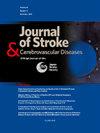治疗颈动脉海绵状瘘的独立经动脉导流术
IF 2
4区 医学
Q3 NEUROSCIENCES
Journal of Stroke & Cerebrovascular Diseases
Pub Date : 2024-10-16
DOI:10.1016/j.jstrokecerebrovasdis.2024.108047
引用次数: 0
摘要
目的:颈动脉海绵窦瘘(CCF)是一种罕见的动静脉沟通疾病,可使血液从颈动脉流入海绵窦。尽管目前线圈和/或液体栓塞仍是治疗 CCF 的首选方法,但血流分流(FD)支架是传统栓塞技术的可行替代方案。本研究探讨了将 FD 支架作为单独治疗 CCFs 方法的技术方面和原理:研究包括 2019 年至 2023 年期间在两家综合卒中中心治疗的 7 名 CCFs 患者的记录。研究排除了使用 FD 支架与线圈和/或液体栓塞联合治疗的患者:5名患者被诊断为直接CCF,2名患者被诊断为间接CCF。六名患者接受了 Surpass Evolve FD 支架治疗,一名患者接受了 Pipeline FD 支架治疗。放置 FD 后,进行了平均 14.4 个月的 DSA 随访。所有患者的瘘管均完全闭塞,没有残余分流。此外,所有患者在治疗后症状均完全消失:作者的经验表明,FD 支架植入术作为一种独立的 CCF 治疗方案,具有良好的疗效和安全性。与栓塞治疗相比,FD 支架能更好地保护母血管并促进愈合,同时减少相关的肿块效应。尽管这是一项样本量相对较小的回顾性自我评估,但据作者所知,这项研究代表了单独使用 FD 支架治疗 CCF 患者的最大个体病例系列。本文章由计算机程序翻译,如有差异,请以英文原文为准。
Stand-alone transarterial flow diversion for treatment of carotid cavernous fistulas
Objective
Carotid-cavernous fistulas (CCFs) are rare arteriovenous communications allowing blood to flow from the carotid artery into the cavernous sinus. Although currently coil and/or liquid embolization remain the preferred treatment methods for CCFs, flow diverters (FD) stents represent a viable alternative to traditional embolization techniques. This study explores both the technical aspects and rationale behind using FD stents as a stand-alone treatment approach for CCFs.
Methods
The study includes records of 7 patients with CCFs treated at two comprehensive stroke centers from 2019 to 2023. Patients treated with FD stenting in conjunction with coil and/or liquid embolization were excluded from the study.
Results
Five patients were diagnosed with direct CCFs and 2 patients with indirect CCFs. Six patients were treated with the Surpass Evolve FD stent and 1 patient with the Pipeline FD stent. DSA follow-up was performed for an average duration of 14.4 months following FD placement. Complete fistula obliteration with no residual shunting was observed in all patients. Furthermore, all patients experienced a complete resolution of symptoms following treatment.
Conclusions
The authors’ experiences suggest the efficacy and safety of FD stenting as a stand-alone treatment option for CCFs. Compared to embolization, FD stents can better preserve the parent vessel and promote healing with less associated mass effect. Despite being a retrospective self-assessment with a relatively small sample size, to the authors’ knowledge, this study represents the largest individual case series of patients with CCF treated with stand-alone FD stenting.
求助全文
通过发布文献求助,成功后即可免费获取论文全文。
去求助
来源期刊

Journal of Stroke & Cerebrovascular Diseases
Medicine-Surgery
CiteScore
5.00
自引率
4.00%
发文量
583
审稿时长
62 days
期刊介绍:
The Journal of Stroke & Cerebrovascular Diseases publishes original papers on basic and clinical science related to the fields of stroke and cerebrovascular diseases. The Journal also features review articles, controversies, methods and technical notes, selected case reports and other original articles of special nature. Its editorial mission is to focus on prevention and repair of cerebrovascular disease. Clinical papers emphasize medical and surgical aspects of stroke, clinical trials and design, epidemiology, stroke care delivery systems and outcomes, imaging sciences and rehabilitation of stroke. The Journal will be of special interest to specialists involved in caring for patients with cerebrovascular disease, including neurologists, neurosurgeons and cardiologists.
 求助内容:
求助内容: 应助结果提醒方式:
应助结果提醒方式:


